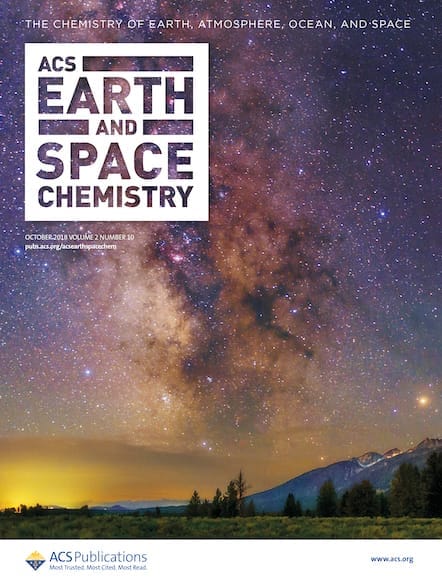In this interview, Prof. Forbes discusses her research, shares her plans for the journal as Editor-in-Chief, and shares her insight into future advancements in the field.

ACS Publications is excited to welcome Professor Patricia Forbes as the new Editor-in-Chief of ACS Earth and Space Chemistry.
Prof. Forbes is a Full Professor in Analytical Chemistry at the University of Pretoria and holds the Rand Water Chemistry Research Chair. She leads the Environmental Monitoring and Sensing research group, which focuses on the development of novel sampling and analytical methods for environmental pollutants, including polycyclic aromatic hydrocarbons, pesticides, mercury, and emerging chemical pollutants. She was previously Environmental Manager at Impala Platinum Refineries and Head of the Air Quality Research Laboratory of the Council for Scientific and Industrial Research (CSIR).
Prof. Forbes has given over 50 invited presentations on her research and has published over 110 journal papers, 14 book chapters, and two books in this regard. She was the recipient of the Chemical Education award of the South African Chemical Institute in 2014, the prestigious international Wharton QS Reimagine Education Award for Presence Learning in 2015, and the University of Pretoria Teaching Excellence and Innovation Laureate award in 2016. Prof. Forbes also received the 2019 ChromSA Chromatographer of the Year award in recognition of her research achievements.
She is a Fellow of both the South African Chemical Institute and the Royal Society of Chemistry (RSC). She was an elected member on the Professional Standards Board of the RSC and is currently the International Local Section Representative on the RSC Member Networks Committee, as well as Chairperson of the RSC Local Section South Africa, North Committee. Prof. Forbes is the Deputy Chair of the Professional Advisory Committee for Chemical Science of the South African Council for Natural Scientific Professions, and she is appointed as the IUPAC National Representative for Analytical Chemistry. She previously served as Editor-in-Chief of the South African Journal of Chemistry and is currently an Editorial Board member of Trends in Analytical Chemistry, Chemosphere, Discover Applied Sciences and Sustainable Chemistry for Climate Action.
Additionally, Prof. Forbes serves as an expert advisor regarding the monitoring of environmental pollutants to the South African Bureau of Standards and the International Organization for Standardization (ISO), as well as to the Minister of the Department of Forestry, Fisheries and the Environment of South Africa.
We recently spoke with Dr. Forbes to learn more about her plans as Editor-in-Chief of ACS Earth and Space Chemistry.
What excites you about your current research?
The application of analytical techniques that we develop in my research group to help address environmental problems and to improve the quality of life of people I find really rewarding. I am thus excited by our ongoing research (often with industry partners) focusing on addressing air and water quality challenges. Many of these are of global relevance, such as the contribution of volatile organic compound emissions to ozone formation, but we also work towards determining local environmental impacts, such as in the case of domestic waste burning in settlements where waste collection services are lacking.
What challenges did you have to overcome on your path to becoming who you are today?
During my early career, chemistry and science as a whole was very male dominated, especially when it came to those in senior positions, so strong female role models were few and far between. I had my daughter while I was completing my PhD part-time whilst I was working in industry. It was tough to juggle everything, but it taught me excellent time management skills and tenacity to not give up on my goals.
What opportunities in your field excite you the most?
It is exciting that you can carve your own future based on your scientific interests and the opportunities you engage with. For me right now, the opportunity to be part of the prestigious ACS Editor-in-Chief team is incredibly exciting! More broadly, opportunities to collaborate with excellent researchers from around the world and from different disciplines provides an inspiring means to expand our outlook and approaches to address environmental challenges.
What do you think is the most interesting or important unsolved problem in chemistry?
Maybe not for chemistry as a whole, but certainly regarding analytical chemistry, the development of portable yet cost effective means to comprehensively analyse samples is the panacea. Such a development would democratise analytical chemistry and it would have major ripple effects into the multitude of fields which rely on sample analysis; extending from medicine and forensics to biology and environmental science. Cost effective sensors, for example, have selectivity and/or sensitivity issues; whilst high resolution mass spectrometers lack portability and are expensive. So although there have been great strides forward in this regard, we are not there yet.
What do you hope to bring to the journal as Editor-in-Chief?
As ACS Earth and Space Chemistry approaches its tenth anniversary since inception, it is clear that the journal has well established itself within the library of environmental chemistry journals. I will strive to continue this positive trajectory at an accelerated pace with the support of the excellent editorial and production teams, whilst working towards modernizing the journal and boosting diversity and inclusion across editorial positions, reviewer involvement and authorship.
What do you wish someone had told you when you were starting out as a chemist?
At my all-girls high school there was very limited guidance available for careers in the sciences. Much of my decision-making around which degree to pursue was thus based on which subjects I enjoyed most (obviously chemistry was high on the list!) and where bursary funding was available. Guidance on the different fields of chemistry and job options associated with them would have been valuable, but fortunately things worked out well and I landed up doing what I really enjoy.
Apart from chemistry, what are you passionate about?
I love trail running—I enjoy the feeling of freedom running in nature brings, and the stillness lets my mind wander. Many new research ideas and solutions to problems have been devised while I have been out on the trails!
